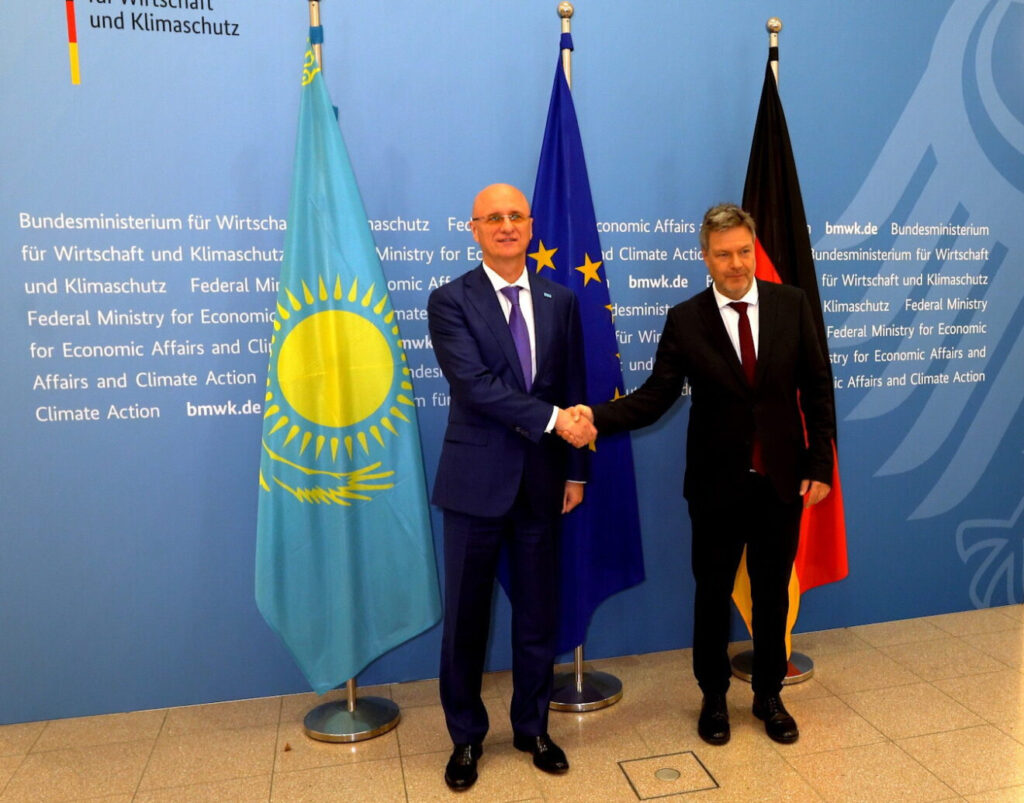ASTANA – German Vice Chancellor and Federal Minister for Economic Affairs and Climate Action Robert Habeck conveyed Germany’s increasing interest in Kazakhstan’s green transformation during negotiations with a Kazakh delegation led by First Deputy Prime Minister Roman Sklyar on Nov. 20 in Berlin, reported the Prime Minister’s press service.
The interest is driven by Kazakhstan’s cheap energy sources and its appeal for large-scale green projects, particularly in the production of energy-intensive products.
Svevind Energy Group initiates the construction of a green hydrogen production complex in western Kazakhstan, attracting an investment of approximately $50 billion. A German hydrogen diplomacy office was opened in Astana this year to effectively implement one of the largest projects in the global hydrogen industry.
The ministers focused on trade and economic cooperation, prioritizing industry, energy, trade, transport, logistics, and agriculture sectors. Sklyar welcomed Kazakhstan’s inclusion in the list of 34 countries eligible for a preferential procedure for investment guarantees.
“We consider this not only an important signal of recognition of our country’s high political stability and security of investments, but also confirmation of interest in expanding business partnerships,” he emphasized.
Habeck called energy and resources cooperation with Kazakhstan as one of the most popular sectors for the German economy. He noted ongoing interaction between the Federal Institute of Geosciences and Natural Resources and the National Geological Service of Kazakhstan, which are expected to form a list of joint specific projects by the summer of 2024.
Zulfiya Suleimenova, Advisor to Kazakh President Kassym-Jomart Tokayev and Special Representative for International Environmental Cooperation, exchanged views with German colleagues on issues of collaboration within the G7 climate club initiated by Germany, the implementation of the Federal government’s Green Central Asia initiative and a number of ongoing cooperative environmental projects.
Kazakh Vice Minister of Agriculture Abulkhair Tamabek and Parliamentary State Secretary to the Federal Minister of Food and Agriculture Ophelia Nick signed a joint statement of intent to develop and deepen cooperation within the German-Kazakh Agricultural Dialogue bilateral cooperation project.
The negotiations outlined specific measures for the implementation of agreements reached at the highest level during President Tokayev’s official visit to Germany.
During a working visit to Berlin, Sklyar discussed current trends in business cooperation between the two countries at a round table with a group of German companies.
“We are interested in cooperation in the context of creating production facilities that make products according to the formula ‘Made in Kazakhstan with German quality,’” he stressed.
According to him, changes in the geopolitical situation and an improved business climate presently open new horizons for mutually beneficial economic cooperation between Kazakhstan and Germany.
With Wolfgang Niedermark, a member of the Executive Board of the Federation of German Industries, Sklyar reviewed possibilities of involving members of Germany’s main economic association in modernizing and increasing Kazakhstan’s industrial potential.
During the negotiations with Executive Director of the Eastern Committee of the German Economy Michael Harms, Sklyar touched on the improvement of activities of the Kazakh-German Business Council, the intergovernmental Kazakh-German working group on trade and economic cooperation, the working group on joint project financing and risk hedging, and the Berlin Eurasian Club.
Meetings with representatives from companies such as LANXESS AG, Rain Carbon, HMS Bergbau AG, Diehl Stiftung, G.Zwiehoff GmbH, and others addressed cooperation opportunities for investment projects in Kazakhstan in such industries as metallurgy, manufacturing, mining, chemicals, and building materials.
Kazakhstan stands as Germany’s leading trade and economic partner in the region, accounting for over 80% of the total volume of German trade with Central Asian countries.
Source : AstanaTimes


